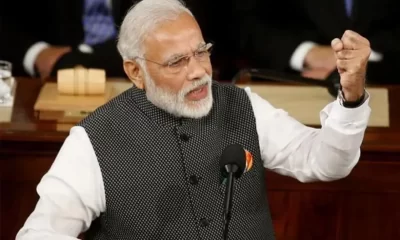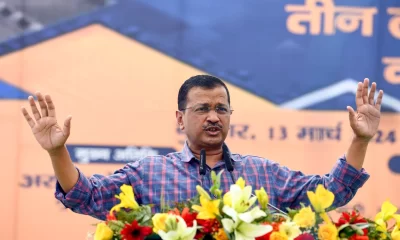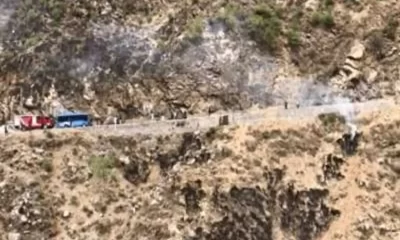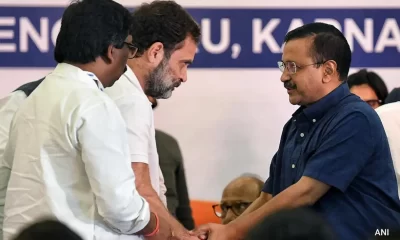Latest world news
India hits back Pakistan Kashmir “rights violations” claims
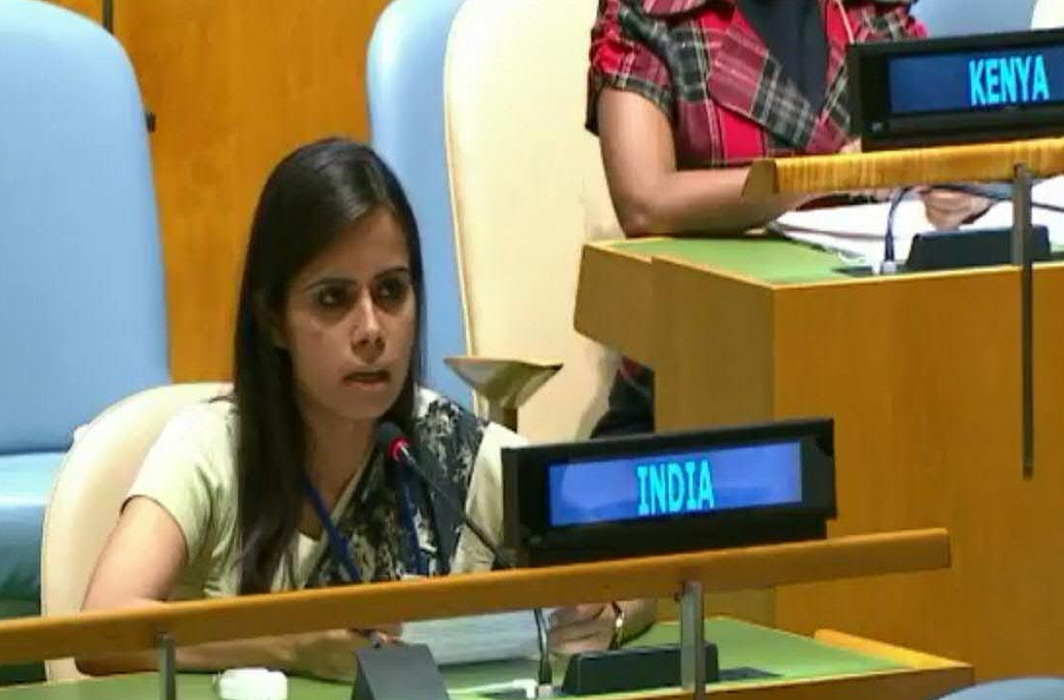
[vc_row][vc_column][vc_column_text]Indian diplomat responds to Pak PM allagations
In a befitting response to Pakistan Prime Minister’s accusations at UN General Assembly against India of engaging in terrorist activities and his warning of a “matching response”, India has, on Thursday, called the neighboring country “Terroristan” for allegedly providing safe havens to global terror leaders and protecting them with political career.
Exercising right to reply after Pakistan PM Shahid Khaqan Abbasi raked up Kashmir issue, Eenam Gambhir, the first secretary at India’s Permanent Mission at UN, said that Pakistan has become “a geography synonymous with terror” with a flourishing “industry” producing and exporting global terror.
Hitting hard at Pakistan, the Indian diplomat at UN said, “By now, all Pakistan’s neighbours are painfully familiar with these tactics to create a narrative based on distortions, deception and deceit.” The state which protected Osama Bin Laden and sheltered Mullah Omar should have the gumption to play the victim, she said.
Substantiating India’s allegations, Gambheer said, “Its current state can be gauged from the fact that Hafiz Mohammed Saeed, a leader of the United Nations designated terrorist organisation Lashkar-e-Taiba, is now sought to be legitimised as a leader of a political party.”
Earlier this month India and Afghanistan, in a veiled attack on Pakistan, had called for an end to all forms of support and state sponsorship of terrorism. This was stated at the end of External Affairs Minister Sushma Swaraj and her Afghan counterpart Salahuddin Rabbani held the second Strategic Partnership council meeting, on September 11, at New Delhi.
After their talks, Rabbani and Sushma Swaraj had said India and Afghanistan remained “united on overcoming the challenges posed by cross-border terrorism and safe havens and sanctuaries to both our countries”.
The senior diplomat reiterated India’s position on Jammu and Kashmir and said, “None of this can justify Pakistan’s avaricious efforts to covet the territories the State of Jammu and Kashmir (which) is and will always remain an integral part of lndia. However much it scales up cross-border terrorism, it will never succeed in undermining India’s territorial integrity.”
Syed Akbaruddin, India’s Permanent Representative at UN tweeted about the diplomatic move;[/vc_column_text][vc_raw_html]JTNDYmxvY2txdW90ZSUyMGNsYXNzJTNEJTIydHdpdHRlci10d2VldCUyMiUyMGRhdGEtbGFuZyUzRCUyMmVuJTIyJTNFJTNDcCUyMGxhbmclM0QlMjJlbiUyMiUyMGRpciUzRCUyMmx0ciUyMiUzRVBha2lzdGFuJTIwaXMlMjBub3clMjBUZXJyb3Jpc3RhbiUzQ2JyJTNFJTI2cXVvdCUzQlF1ZXN0JTIwZm9yJTIwYSUyMGxhbmQlMjBvZiUyMHB1cmUlMjBoYXMlMjBwcm9kdWNlZCUyMHRoZSUyMGxhbmQlMjBvZiUyMHB1cmUlMjB0ZXJyb3IlMjZxdW90JTNCJTIwLSUyMCUzQ2ElMjBocmVmJTNEJTIyaHR0cHMlM0ElMkYlMkZ0d2l0dGVyLmNvbSUyRkluZGlhVU5OZXdZb3JrJTIyJTNFJTQwSW5kaWFVTk5ld1lvcmslM0MlMkZhJTNFJTIwcmVwbGllcyUyMHRvJTIwUGFraXN0YW4lMjAlM0NhJTIwaHJlZiUzRCUyMmh0dHBzJTNBJTJGJTJGdHdpdHRlci5jb20lMkZVTiUyMiUzRSU0MFVOJTNDJTJGYSUzRSUyMCUzQ2ElMjBocmVmJTNEJTIyaHR0cHMlM0ElMkYlMkZ0LmNvJTJGSTJuOE5xMGQ3aSUyMiUzRXBpYy50d2l0dGVyLmNvbSUyRkkybjhOcTBkN2klM0MlMkZhJTNFJTNDJTJGcCUzRSUyNm1kYXNoJTNCJTIwU3llZCUyMEFrYmFydWRkaW4lMjAlMjglNDBBa2JhcnVkZGluSW5kaWElMjklMjAlM0NhJTIwaHJlZiUzRCUyMmh0dHBzJTNBJTJGJTJGdHdpdHRlci5jb20lMkZBa2JhcnVkZGluSW5kaWElMkZzdGF0dXMlMkY5MTEwNTY5MjUxMzkzMDg1NDYlMjIlM0VTZXB0ZW1iZXIlMjAyMiUyQyUyMDIwMTclM0MlMkZhJTNFJTNDJTJGYmxvY2txdW90ZSUzRSUwQSUzQ3NjcmlwdCUyMGFzeW5jJTIwc3JjJTNEJTIyJTJGJTJGcGxhdGZvcm0udHdpdHRlci5jb20lMkZ3aWRnZXRzLmpzJTIyJTIwY2hhcnNldCUzRCUyMnV0Zi04JTIyJTNFJTNDJTJGc2NyaXB0JTNFJTBB[/vc_raw_html][vc_column_text]Earlier Pakistan PM Shahid Khaqan Abbasi, accused India of indulging in terror activities against his country and warned of a “matching response” if it ventures across LoC” or acts upon its “doctrine of limited war against Pakistan.” He also urged UN to appoint a special envoy to Kashmir alleging that India was “brutally” suppressing the people’s struggle in the region.
Playing as victim of terrorism, Pakistan PM said, “having suffered and sacrificed so much due to our role in the global counter terrorism campaign, it is especially galling for Pakistan to be blamed for the military or political stalemate in Afghanistan.”
The Indian diplomat rejected Pakistan’s claim by saying,“ Even as terrorists thrive in Pakistan and roam its streets with impunity, we have heard it lecture about the protection of human rights in India. The world does not need lessons on democracy and human rights from a country whose own situation is charitably described as a failed state.”
Ministry of External Affairs policy document, available at its website, says, “India desires peaceful, friendly and cooperative relations with Pakistan, which require an environment free from violence and terrorism.” However, it further says, “Terrorism emanating from territory under Pakistan’s control remains a core concern in bilateral relations.”
Recently India had successfully convinced BRICS leaders during their Summit at Xiamen, China resulting with a document enlisting Pakistan based groups Jaish-e-Mohammad and Lashkar-e-Toiba in the terror outfits list. Earlier China had been blocking India’s efforts to get Hafiz Saeed enlisted in UN terrorists sanctioned list.[/vc_column_text][/vc_column][/vc_row]
Latest world news
World Earth Day 2024: Google Doodle showcases aerial view of planet’s natural beauty
Google celebrated Earth Day 2024 with a special doodle featuring an aerial view of our planet’s biodiversity.
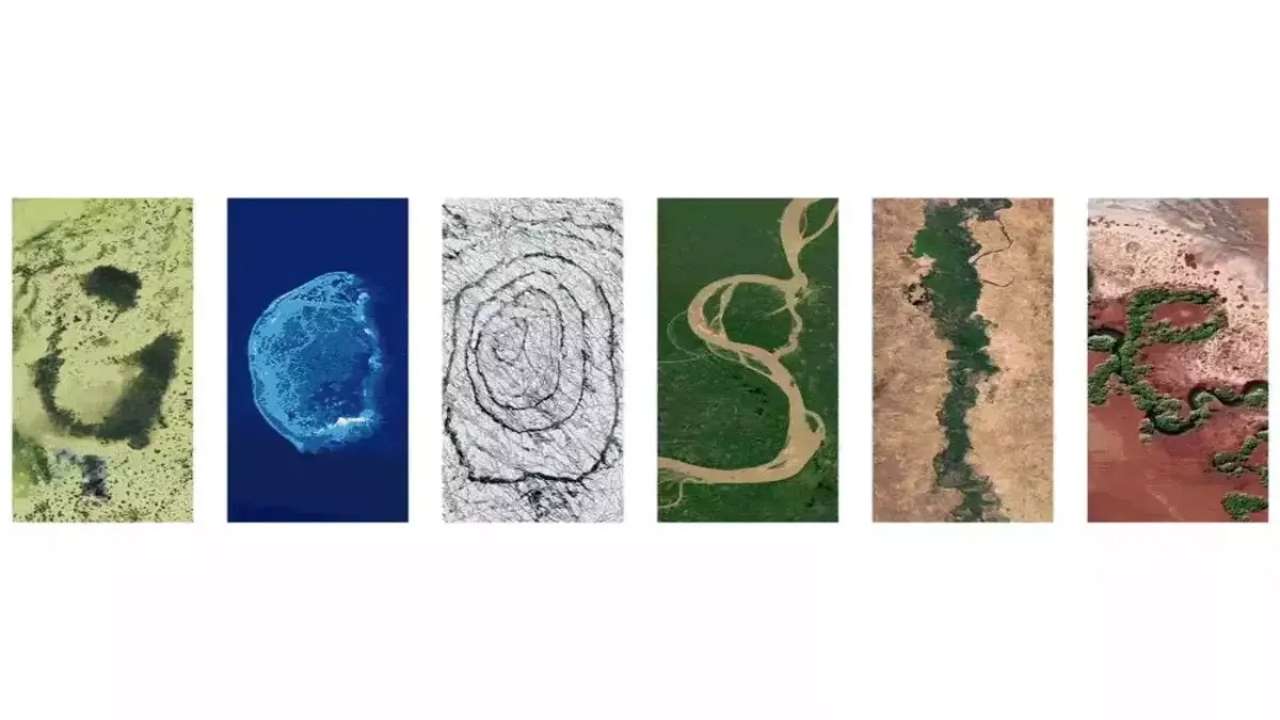
Google shared a doodle today to celebrate World Earth Day 2024, which showcased aerial photos of the planet’s biodiversity and natural beauty. Google reminded us of the importance of protecting planet earth for future generations with the help of this doodle.
The Google letters depict specific locations across the globe where people, communities, and governments work every day to help protect the planet’s natural beauty, biodiversity, and resources, according to the explanation of the annual Earth Day 2024 doodle on their website.
It said, these examples remind us that there’s much more to do to address the climate crisis and biodiversity loss, but also offer the promise of hope and optimism.
The islands of Turks and Caicos are represented by the letter “G.” The islands’ conservation efforts are concentrated on protecting important regions for biodiversity and addressing persistent environmental problems.
The largest reef in the southern Gulf of Mexico and a UNESCO biosphere reserve, Scorpion Reef National Park, is represented by the letter “O” in the Mexican flag.
The letter “O” features Iceland’s Vatnajokull National Park, which was designated as a national park in 2008 following decades of advocacy. The ecology within and surrounding the biggest glacier in Europe is safeguarded by this UNESCO World Heritage Site.
The letter “G” has the Jau National Park in Brazil on it. It is a UNESCO World Heritage Site and one of the biggest forest reserves in South America.
The Great Green Wall of Nigeria is represented by the letter “L,” and the Pilbara Islands Nature Reserves of Australia are represented by the letter “E.”
Meanwhile, Earth Day is a worldwide event that promotes protection of the environment every year. April 22 serves as a reminder of the importance of conservation efforts and sustainable practices to guarantee a healthier world and a brighter future.
The occasion inspires people across the world to come together and take action to protect the environment, strengthening our bonds with nature and promoting good change.
Latest world news
Bigg Boss 14 contestant Rahul Vaidya struggles walking in knee deep water, compares Dubai rains with Mumbai floods
Singer and TV personality Rahul Vaidya was recently stranded in the Dubai rains.

Rahul Vaidya, who was in Dubai ahead of his show which was scheduled to take place today, left the country due to heavy rains and reached Kolkata. The artist shared on social media his encounters in the UAE city, including challenges like walking through knee-deep water. Rahul provided an update regarding the heavy rainfall in Dubai on his Instagram profile.
The Bigg Boss 14 contestant revealed that he was in Kolkata and prepared to do an evening performance. Recalling the terrifying period he went through, Vaidya said there was a lot of confusion and panic in Dubai. The situation was similar to that when heavy floods hit Mumbai in 2005.
Vaiday also posted seval other images and videos of cars that were underwater and flooded roadways. The Bigg Boss 14 contestant, who shared his ordeal, claimed that even though it had just rained for two hours, the situation was dire.
In one of the video, which went viral he can be seen struggling in walking in knee-deep water. He can be also seen holding his sneakers in one hand and with other hand he was seen managing other things.
This is the result of the two hours of rain that it had, he can be heard saying in the video. Vidya also said he dosen’t believe Dubai is accustomed to a lot of rain. Everything had stopped working, he remarked.
After taking part in the first season of the singing reality show Indian Idol, Rahul Vaidya gained widespread recognition. In addition to Bigg Boss, he took part in Khatron Ke Khiladi 11.
Meanwhile, heavy rains that triggered flooding in the UAE and Bahrain, which left 18 people dead in Oman on Sunday and Monday, have paralyzed the financial hub of the Middle East, Dubai.
A lot of incoming flights were diverted from Dubai’s international airport because of the rain. At 7:26 p.m., the busiest airport in the world for foreign visitors stopped accepting new arrivals; a gradual resumption was announced for more than two hours later.
Images of planes navigating flooded tarmacs are making the rounds on social media.
According to pictures shared on social media, the flagship malls Dubai Mall and Mall of the Emirates both experienced heavy floods, while at least one Dubai Metro station had water up to the ankles.
There were several road collapses, severe flooding in residential areas, and numerous reports of leaks from windows, doors, and roofs.
Due to the unfavourable weather, schools around the United Arab Emirates were forced to close, and as more storms are predicted, the closures are anticipated to last until Wednesday. The government of Dubai allowed its staff to work remotely till this Wednesday.
Latest world news
Dubai sky turns green during storm in UAE, video goes viral
The UAE witnessed record-breaking rainfall on Tuesday and the National Centre of Meteorology recorded 254 mm of rainfall in less than 24 hrs in the Khatm Al Shakla area in Al Ain.

1 person was killed in UAE as it witnessed heavy rainfall on Tuesday, stranding commuters, flooding roads, disrupting trains and flights and resulting in water leakage from mall ceilings. The UAE witnessed record-breaking rainfall on Tuesday and the National Centre of Meteorology recorded 254 mm of rainfall in less than 24 hrs in the Khatm Al Shakla area in Al Ain. It is being said that the rainfall was the highest documented since the start of data collection in 1949.
The heavy rainfall in UAE came days after a similar situation in neighbouring Oman, where 13 people were killed in flash floods. Many parts of Oman saw torrential rains, which caused students to be trapped in buses and swept away motorists and trapped people in their homes.
Videos from Dubai circulating on social media showed widespread waterlogging on roads in Abu Dhabi, Dubai and other important cities. This left daily commuters in cars and other vehicles struggling to get back home. Dubai metro station too was seen flooded and closed.
One such video circulating on social media shows the aerial view of the city of Dubai from the top of a building. In the video the stormy winds are seen blowing over the city of Dubai. As the storm intensifies the Dubai sky turns green and ultimately gets covered by heavy rainfall. The video has gone viral on social media with more than 1.1 million views.
Another video showed water leakage from the ceilings of shopping malls, flooding the floors and destroying goods. A video which was shot in the famous Mall of the Emirates, showed pieces of ceiling falling as the rainwater gushed inside. Videos from many outlets of the Deira City Centre mall chain showed escalators being rendered unusable. Majid Al Futtaim, the company which owns the Mall of Emirates, said that the shopping complexes have been kept open and the customers are being sent away from the flooded areas.
-
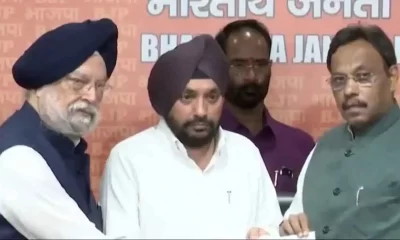
 2024 Lok Sabha Elections23 hours ago
2024 Lok Sabha Elections23 hours agoFormer Delhi Congress chief Arvinder Singh Lovely joins BJP
-
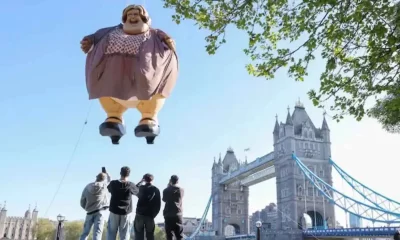
 Entertainment22 hours ago
Entertainment22 hours agoAunt Marge Dursley replica from Harry Potter floated in front of London’s Tower Bridge, video goes viral
-
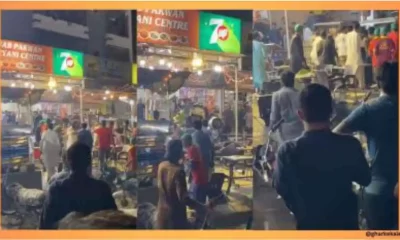
 Trending20 hours ago
Trending20 hours agoViolent clash takes place at Karachi dhaba, video goes viral
-
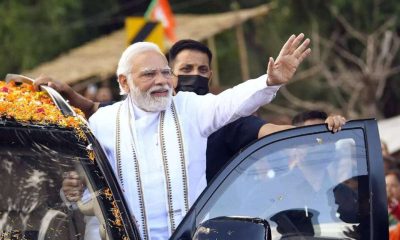
 2024 Lok Sabha Elections5 hours ago
2024 Lok Sabha Elections5 hours agoLok Sabha election 2024: PM Modi to hold roadshow in Ayodhya
-

 Entertainment4 hours ago
Entertainment4 hours agoKareena Kapoor appointed UNICEF India national ambassador, says it’s an emotional day for her
-

 India News3 hours ago
India News3 hours agoWrestler Bajrang Punia suspended by National Anti Doping Body after failing to give urine sample
-

 Entertainment39 mins ago
Entertainment39 mins agoRanbir Kapoor, Alia Bhatt’s daughter Raha enjoys Sunday outing with Ayan Mukharji, video goes viral





